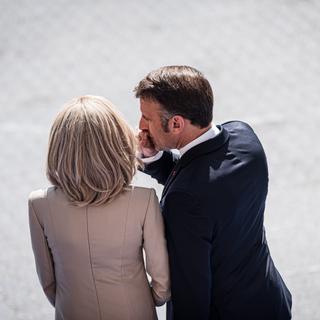


Emmanuel Macron's art of secrecy
Investigation'The Two Emmanuel Macrons' (4/4). In the final part of a series on how the president has changed since arriving at the Elysée, Le Monde looks at how he manages issues related to personal security and protecting his image.
"Burn everything!" In 2017, during his first presidential campaign, in between rallies and appointments, Emmanuel Macron would sometimes hand his bodyguard folders and, for those that were red-colored, he would instruct him to make their contents disappear. Alexandre Benalla, who had been responsible for the candidate's security at the time, remembers this well: He would throw the sheets of paper into a metal drum himself, in the basement of Macron's campaign HQ, on Rue de l'Abbé-Groult in Paris's 15th arrondissement, and then set fire to them. Sometimes, an improvised brazier would be set up by the roadside, for example, on the way to an airport from where the future president would be taking off to attend a rally. Inside would be notes, scribbled ideas, various campaign documents, etc. Macron hadn't even been elected yet, and secrecy was already his obsession.
"Hyper-cloistered," "super-paranoid," "enigmatic": This is how some of the president's closest associates describe him today. It's the lot of presidents. Yet mistrust and caution are reflexes that Macron learned very early on in his life. He spent part of his teens and 20s living a clandestinity of sorts. "Fifteen years (...) of being largely misunderstood," he confided to Le Figaro journalist Anne Fulda, as she wrote in her book about him, Emmanuel Macron, un jeune homme si parfait ("Emmanuel Macron, such a perfect young man"). Because Brigitte Trogneux was 24 years his senior, he spent years hiding their love story from others. "Emmanuel needs everyone and no one," Brigitte Macron once told her husband's biographer. "You never enter his perimeter." From his time in his home city of Amiens, northern France, the president kept a certain habit of compartmentalization and solitude.
Macron operates through communication silos. He is the only one who knows who he's talking to via text messages, late at night. The insomniac president often works until 2 am, as his Telegram account attests. "It's time to think"; "How do you see things?" he writes, on WhatsApp, to his small groups composed of former ministers, friends, elected officials, prefects, mayors he has met on trips around the country, or, at the height of the Covid-19 pandemic, doctors. He also writes "I miss you," "I'm proud of you," "you've hurt me," "you are family," or, before a political break-up with someone: "Our paths are separating." Macron, who is usually so impenetrable, has, at times, shown carelessness in his written messages. (Macron was contacted for comment several times over the last week via the Elysée Palace and direct messages. He did not respond.)
You have 85.56% of this article left to read. The rest is for subscribers only.
